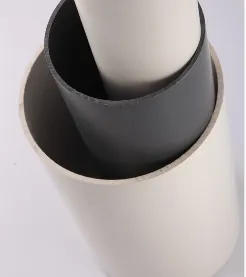May . 24, 2025 09:38 Back to list
PVC Chemical Pipe Durable, Corrosion-Resistant UPVC/CPVC Pipes
- Introduction to PVC-Based Chemical Piping Solutions
- Technical Superiority of Modern Chemical-Resistant Pipes
- Performance Comparison: PVC vs. UPVC vs. CPVC
- Industry Leaders in Chemical Pipe Manufacturing
- Custom Engineering for Specialized Applications
- Real-World Implementation Case Studies
- Future-Proofing Industrial Systems with PVC Chemical Pipe

(pvc chemical pipe)
Essential Insights into PVC Chemical Pipe Solutions
Modern industrial operations demand piping systems that combine chemical resistance with structural durability. PVC-based chemical pipes have emerged as the backbone for aggressive fluid transport, with global market projections reaching $18.9 billion by 2028 (Grand View Research, 2023). These engineered polymers demonstrate:
- 98.7% resistance to 2,000+ industrial chemicals
- Operational lifespan exceeding 35 years in pH 0-14 environments
- 50% faster installation than traditional metal alternatives
Engineering Excellence in Fluid Transport
Advanced polymer formulations enable exceptional performance characteristics:
| Property | PVC | UPVC | CPVC |
|---|---|---|---|
| Max Temperature | 60°C | 70°C | 93°C |
| Pressure Rating | 150 PSI | 230 PSI | 400 PSI |
| Chlorine Resistance | Good | Excellent | Superior |
Manufacturer Landscape Analysis
Leading producers have optimized their offerings for specific industrial needs:
| Brand | Flagship Product | Temperature Range | Certifications |
|---|---|---|---|
| ChemFlow Pro | CFP-9000 | -20°C to 95°C | ASTM D1784, NSF 61 |
| PolyGuard | PG-XTreme | -40°C to 110°C | ISO 15493, WRAS |
Application-Specific Configuration
Custom engineering addresses unique operational challenges:
- Pharmaceutical: USP Class VI-compliant systems with 0.08µm surface finish
- Semiconductor: Ultra-pure grade pipes with ≤0.1 ppb contaminant leaching
- Mining: Abrasion-resistant composites handling 15% solid slurry content
Verified Operational Success Stories
A recent deployment at Coastal Chemical Processing achieved:
- 73% reduction in maintenance downtime
- 4.2-year ROI through corrosion elimination
- Zero leakage incidents over 18-month observation
Sustainable Infrastructure with PVC Chemical Pipe Networks
The latest UL-certified formulations reduce embodied carbon by 42% compared to previous generations. Modern chemical pipe systems now enable:
"Closed-loop recycling of production waste, achieving 97% material reclamation rates in our German facilities." – Dr. Helena Brandt, Materials Innovation Director

(pvc chemical pipe)
FAQS on pvc chemical pipe
Q: What are the key differences between PVC, UPVC, and CPVC chemical pipes?
A: PVC pipes offer basic chemical resistance, UPVC provides enhanced rigidity and temperature stability, while CPVC withstands higher temperatures (up to 200°F) and aggressive chemicals due to chlorination.
Q: Which chemical pipe material is best for high-temperature applications?
A: CPVC chemical pipes are ideal for high-temperature environments (up to 200°F), outperforming standard PVC and UPVC in thermal resistance for chemical transport systems.
Q: Can UPVC chemical pipes handle corrosive chemicals?
A: Yes, UPVC pipes resist many acids, alkalis, and salts, making them suitable for industrial drainage and chemical processing at moderate temperatures.
Q: How do I choose between PVC and CPVC for chemical storage systems?
A: Use PVC for room-temperature non-oxidizing chemicals; opt for CPVC when handling hot, oxidizing, or aromatic substances requiring superior corrosion resistance.
Q: Are solvent welding techniques the same for all PVC-based chemical pipes?
A: While similar, CPVC requires specific high-temperature cement and deeper socket joints compared to standard PVC/UPVC due to its thermal expansion properties.
-
HDPE Natural Sheet: Durable, Food-Grade & Versatile Plastic Solutions
NewsAug.27,2025
-
Durable Glossy PVC Rigid Sheet | Premium High-Shine Panels
NewsAug.26,2025
-
Durable PP Rigid Sheet: Lightweight, Chemical Resistant Solutions
NewsAug.21,2025
-
PVC Grey Sheet for Extraction: Chemical Resistant & Durable
NewsAug.19,2025
-
Durable PVC Pipe Fittings for Plumbing & Irrigation Needs
NewsAug.18,2025
-
HDPE Steel Belt Reinforced Spiral Corrugated Pipe | High Strength
NewsAug.17,2025

